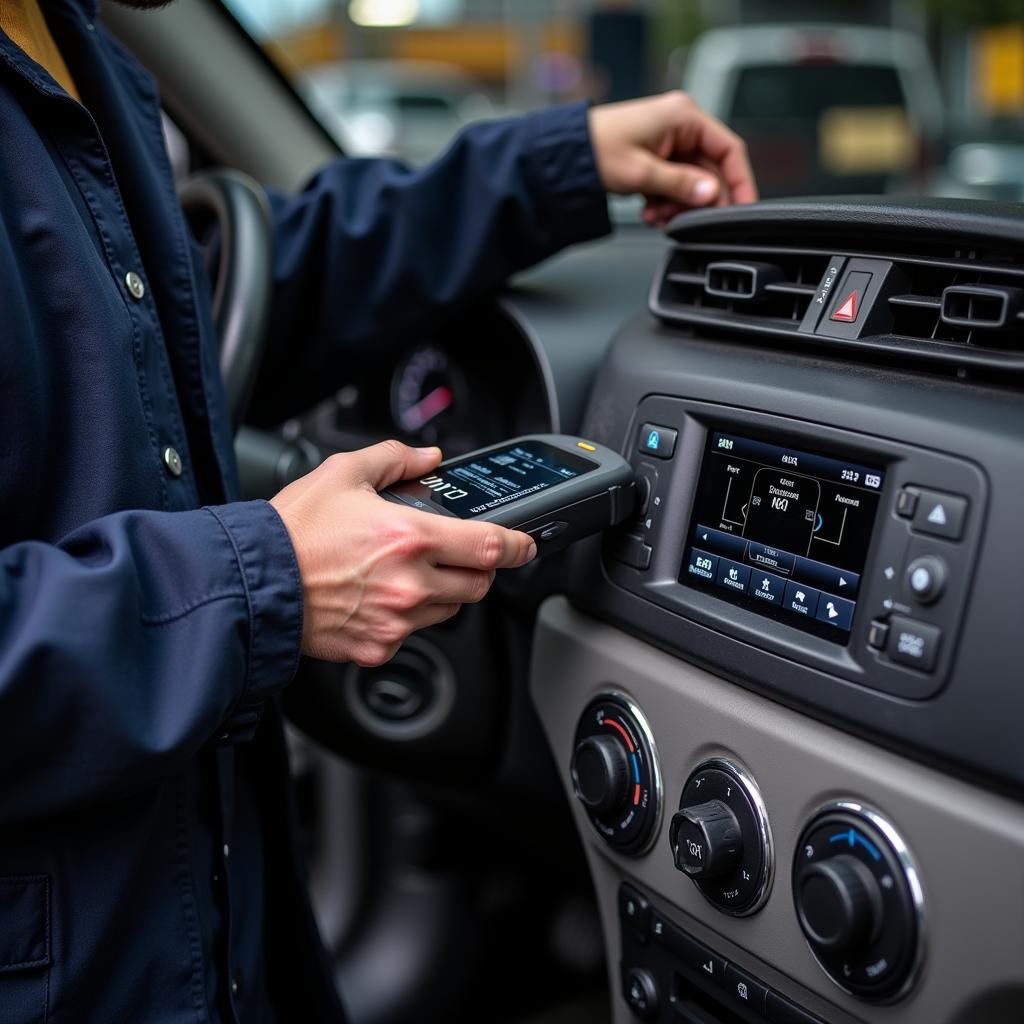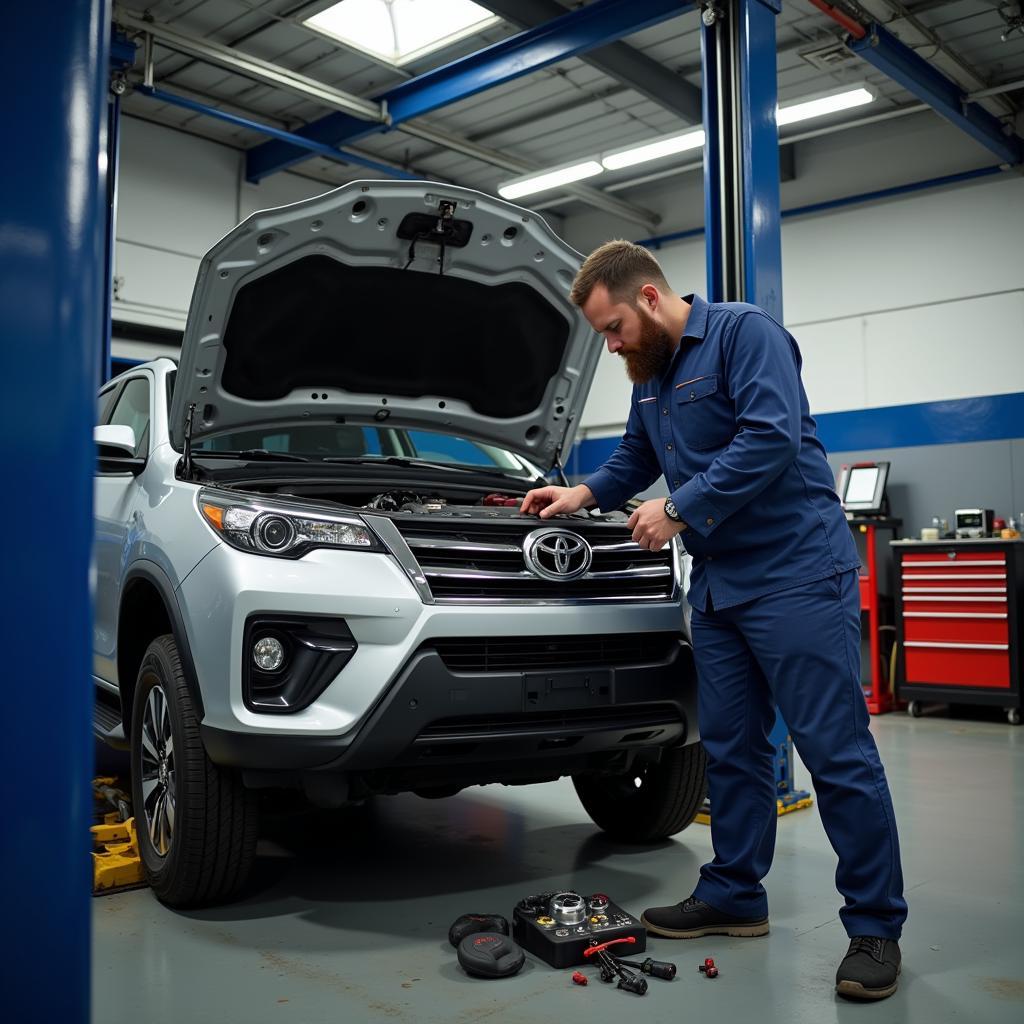If your car’s acting up, a car diagnostic test is the first step to figuring out the problem. But how long should you expect to wait at the mechanic? While the answer isn’t always cut and dry, this article will give you a clear understanding of the factors involved and what to expect when you take your car in.
 Car Diagnostic Test Process
Car Diagnostic Test Process
Factors Affecting Diagnostic Test Duration
The time it takes to run a car diagnostic can vary greatly depending on several factors:
- Complexity of the issue: A simple sensor problem might be identified quickly, while a complex electrical issue could require more extensive testing.
- Type of diagnostic tool: Basic code readers provide limited information, while advanced scanners used by mechanics offer in-depth analysis and can take longer.
- Mechanic’s experience: An experienced mechanic can often diagnose problems faster due to their knowledge and familiarity with various car models.
- Accessibility of the problem area: If the issue is in a hard-to-reach location, it may take longer to access and diagnose.
Typical Diagnostic Test Time Frames
While there are exceptions, here’s a general idea of how long different types of diagnostic tests might take:
- Basic code reading: 15-30 minutes. This involves retrieving error codes stored in your car’s computer system, which can often pinpoint the general area of the problem.
- Comprehensive diagnostic scan: 1-2 hours. This involves a more thorough scan of all your car’s systems, checking for underlying issues and potential future problems.
- Specialized diagnostic testing: 2+ hours. This may be necessary for complex issues like intermittent electrical problems or intricate mechanical malfunctions. This involves specialized equipment and procedures that require more time to perform accurately.
What Happens During a Car Diagnostic?
A car diagnostic test involves connecting a scan tool to your vehicle’s On-Board Diagnostics (OBD-II) port. This port allows the tool to communicate with your car’s computer and access data from various sensors and systems. The mechanic will then use the information gathered to:
- Read and interpret error codes: These codes provide clues about potential problems within specific systems.
- Analyze live data streams: This shows how different components are performing in real-time, helping pinpoint malfunctions.
- Conduct component activations: The tool can activate certain components, like lights or windows, to test their functionality.
Can I Diagnose My Car Myself?
While affordable OBD-II code readers are available for purchase, they offer limited functionality compared to professional-grade tools. You can use them to get a basic understanding of what might be wrong, but keep in mind:
- Codes don’t always tell the whole story: A code might indicate a symptom rather than the root cause of a problem.
- Misinterpreting codes can be costly: Incorrectly diagnosing an issue could lead to unnecessary repairs or even further damage.
When Should You See a Mechanic?
If your check engine light is on or you’re experiencing any unusual car behavior, it’s best to schedule a diagnostic test with a qualified mechanic. They have the knowledge, experience, and tools to:
- Accurately diagnose the problem: Their expertise ensures you address the root cause and not just a symptom.
- Recommend appropriate repairs: They’ll suggest the most effective and cost-efficient solutions for your specific issue.
- Prevent further damage: Timely diagnosis and repair can save you from more extensive and expensive problems down the road.
“It’s always better to err on the side of caution,” says John Smith, a senior automotive technician at ABC Auto Repair. “A seemingly minor issue can quickly escalate into a major problem if left unaddressed. A professional diagnostic test is a small investment that can save you time, money, and headaches in the long run.”
 Modern Car Repair Shop
Modern Car Repair Shop
Conclusion
Understanding how long a car diagnostic takes requires considering various factors specific to your situation. While basic diagnostics can be relatively quick, complex issues may require more time for comprehensive testing. Remember, a professional diagnosis is an essential step in keeping your car running smoothly and avoiding costly repairs down the line.
For more information on how to use car diagnostic tools effectively, you can refer to our comprehensive guide on how to use a car diagnostic tool. And if you want to delve deeper into performing diagnostic tests, check out our step-by-step instructions on how to do a diagnostic test on a car.
FAQs about Car Diagnostics
Q: How much does a car diagnostic test cost?
A: The cost can range from $50 to $200 or more, depending on the shop’s labor rates and the complexity of the issue.
Q: Can a diagnostic test tell me if my car needs a new battery?
A: Yes, a diagnostic test can often detect battery problems by analyzing the charging system and battery voltage.
Q: Will a car diagnostic reset my check engine light?
A: In most cases, yes. However, the light will come back on if the underlying issue isn’t addressed.
Q: Can I drive my car with the check engine light on?
A: It depends on the severity of the problem. It’s best to get your car checked as soon as possible to avoid potential damage.
Q: Is a car diagnostic test the same as an inspection?
A: No. A diagnostic test focuses on identifying problems within your car’s systems, while an inspection is a visual check of your vehicle’s overall condition.
For further assistance or to schedule a car diagnostic, feel free to reach out to our team via WhatsApp at +1(641)206-8880 or email us at [email protected]. We are available 24/7 to answer your questions and provide expert advice.
Explore our website for more insightful articles on car diagnostics:

Leave a Reply